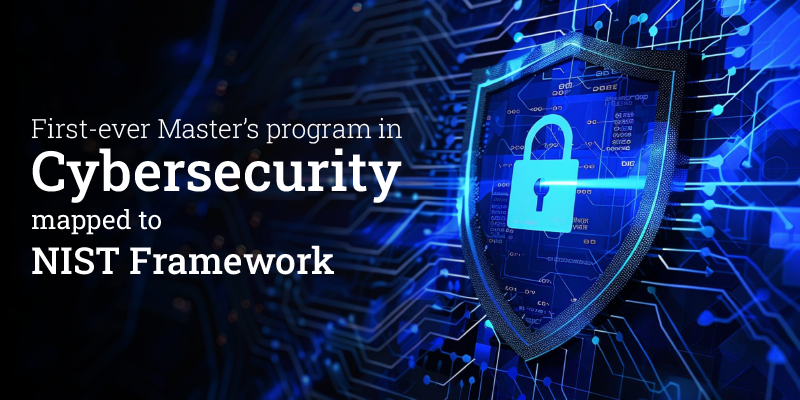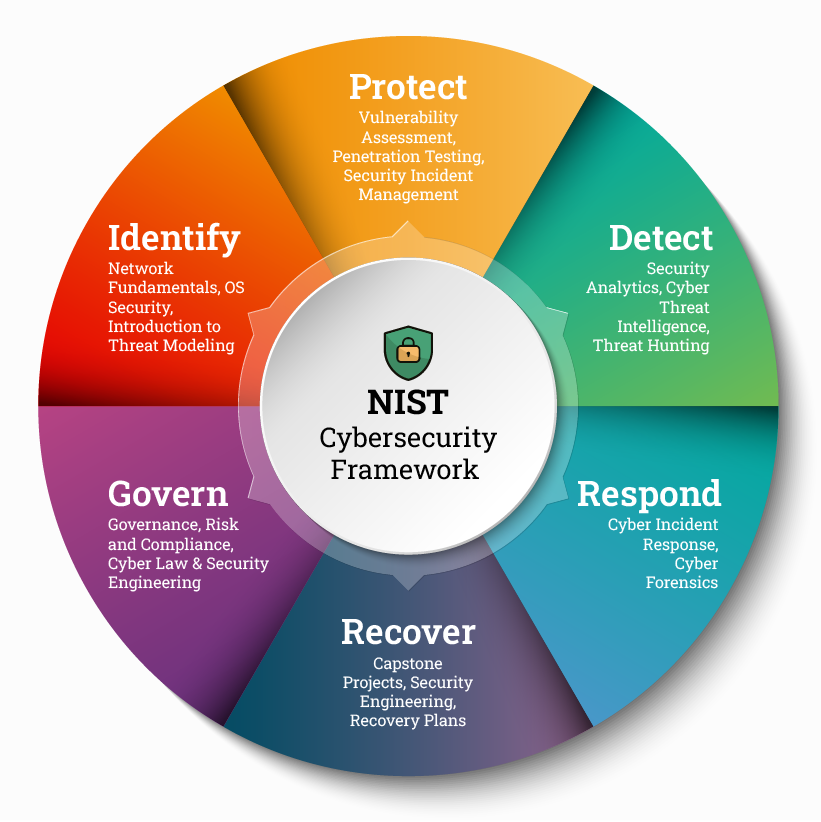First-ever Master’s program in Cybersecurity mapped to NIST Framework

Masters in Cybersecurity – A program like no other!
The M.Tech/MSc in Cybersecurity program offered by REVA Academy for Corporate Excellence (RACE) at REVA University is designed to equip cybersecurity leaders with the skills needed to navigate the increasingly complex and dynamic cybersecurity landscape. The program’s structure, content, and objectives align closely with the National Institute of Standards and Technology (NIST) Cybersecurity Framework, which provides a policy framework of cyber security guidance for how private sector organizations can assess and improve their ability to prevent, detect, and respond to cyberattacks.
This article explores the integration of the M.Tech Cybersecurity program offered by RACE with the NIST Framework’s six core functions: Identify, Protect, Detect, Respond, Recover and Govern.
1. Identify: Understanding Cybersecurity Risks
The NIST Framework emphasizes the importance of identifying the risks that could affect the security of an organization’s information systems. The M.Tech Cybersecurity program covers this extensively through its courses on Network Fundamentals and Infrastructure Security, OS Security, and Introduction to Threat Modeling. These modules provide the tools to recognize and classify the various threats and vulnerabilities that exist within an IT ecosystem, aligning with the “Identify” function of the NIST framework.
2. Protect: Safeguarding Systems and Data
Once potential risks are identified, the next step is to protect systems and data from being compromised. The program includes extensive hands-on training in areas such as Vulnerability Assessment, Penetration Testing, and Security Incident Management. These areas align with the “Protect” function of the NIST Framework by equipping participants with the skills necessary to implement safeguards and mitigate potential threats.
The program’s collaboration with EC-Council and the use of tools such as Azure Sentinel further enhance this aspect, allowing participants to implement platform protections and ensure robust security architectures.
3. Detect: Identifying Cybersecurity Events
Detection of cybersecurity events in real time is crucial for minimizing damage. The NIST Framework’s “Detect” function is addressed through the M.Tech/M.Sc in Cybersecurity program’s modules on Security Analytics, Cyber Threat Intelligence, and Threat Hunting. These courses teach participants how to monitor networks and systems continuously to detect unauthorized access, potential breaches, and other suspicious activities.
Practical labs using SIEM tools like Splunk and Azure Sentinel are integral to this training, ensuring that participants are proficient in using industry-standard tools to detect and respond to threats promptly.
4. Respond: Taking Action During Cybersecurity Events
Effective response to cybersecurity incidents is critical for minimizing damage and restoring normal operations. The M.Tech/M.Sc program includes a dedicated course on Cyber Incident Response Planning, which aligns with the “Respond” function of the NIST Framework. This module provides participants with the knowledge and skills needed to create and implement incident response plans, conduct forensic analysis, and communicate with stakeholders during and after a security event.
Additionally, the program’s focus on Cyber Forensics provides participants with the ability to analyze security incidents comprehensively, ensuring that they can contribute effectively to the incident response process.
5. Recover: Restoring Normal Operations
The “Recover” function of the NIST Framework involves restoring capabilities or services that were impaired due to a cybersecurity event. The M.Tech/M.Sc program addresses this through its capstone projects and research initiatives, which often involve developing and implementing recovery strategies for simulated real-world scenarios.
Participants are tasked with creating detailed recovery plans and presenting their solutions, which not only enhances their understanding of the recovery process but also prepares them to lead such efforts in real-world situations.
6. Govern: Ensuring Robust Cybersecurity Governance
The newly recognized “Govern” function is essential for overseeing and ensuring the effectiveness of the cybersecurity strategy within an organization. The M.Tech Cybersecurity program integrates governance through its modules on Governance, Risk, and Compliance (GRC), Cyber Law, and Security Engineering. These courses equip students with the knowledge to develop and implement robust cybersecurity governance frameworks, ensuring compliance with regulations and aligning cybersecurity strategies with business objectives.

Conclusion
The M.Tech/M.Sc in the Cybersecurity program at REVA University is deeply integrated with the principles and practices outlined in the NIST Cybersecurity Framework. By aligning its curriculum with the framework’s core functions—Identity, Protect, Detect, Respond, Recover and Govern—the program ensures that its graduates are not only well-versed in cybersecurity theory but also possess the practical skills required to implement effective cybersecurity strategies in any organization.
As cybersecurity threats continue to evolve, the need for professionals who can apply comprehensive frameworks like NIST in real-world scenarios will only grow. This program’s alignment with the NIST Framework positions its graduates to meet this demand, making them valuable assets in the global fight against cybercrime.
Check out here to learn more about our bespoke program on MTech in Cybersecurity which combines technologies, tools and processes aligned to NIST.
Visit our website race.reva.edu.in or Call: +91 80693 78092 or write to us: race@reva.edu.in.



